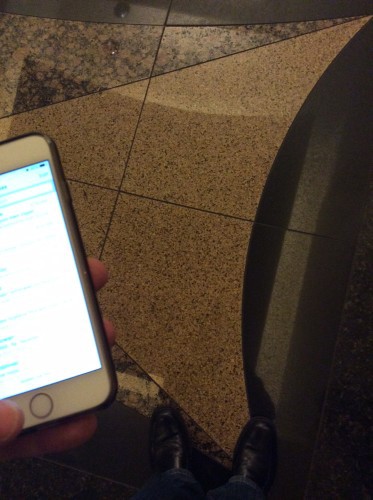It's easy to point fingers at others who don't do what they know they're supposed to do.
Why don't those nurses and doctors properly clean their hands when they enter and leave every patient room? Why do some surgeons still maintain an intimidating environment in the operating room? Why do some managers or executives ignore their employees' concerns and ideas?
“No, no, our organization doesn't have these problems, people might say.” Ok, sure.
People know (I hope) at this point that proper hand hygiene reduces hospital-acquired infections (HAIs). They should know that better teamwork and respectful behaviors improve safety in the operating room and beyond. Managers know they should listen to their employees and help them improve. Right?
It's sometimes helpful to be reflective and introspective instead of just trying to figure others out.
For example, why do I walk and read my iPhone while walking through airports and parking lots? I know this isn't really a safe behavior. I've told myself I shouldn't do this. But, I do.

When I visit the Toyota truck plant in San Antonio, they have a few key safety reminders for employees to follow. These include:
- Don't walk with your hands in your pockets (because it's harder to regain your balance if you slip when you're doing this)
- Don't walk and use your phone (texting, reading, etc.)
- Stop at all intersections in the plant (look out for vehicles and others!)
I'd hope that Toyota leaders:
- Lead by example and follow these behaviors themselves
- Respectfully call people out ANY time they see an unsafe behavior (rather than just reacting after an incident)
I know that if I “walk and iPhone,” that I'm increasing my risk of tripping, bumping into somebody, or falling. But, I do it.
Listen to Mark read this episode (Learn more):
I told myself at the beginning of the year that I shouldn't do this (ah, a dreaded high-failure rate “New Year's resolution). But, I catch myself still doing it.
I have nobody holding me accountable other than myself here. There's no manager or executive watching to correct me or remind me.
I heard a story recently, about a hospital employee who fell and broke her ankle because she was walking and texting.
We hear stories like that, but it's easy to make excuses.
“I'm not that clumsy.”
“I'm very careful.”
“It won't happen to me.”
“I'm too busy, so I have to cut this corner on safety… and the risk is low.”
Those are things I find myself thinking. Those are probably the same things people say when they don't take the time to properly gown up when entering an isolation patient's room. They might think those things when deciding to skip a pre-op checklist because the O.R. is running behind schedule.
“It'll be OK.”
“We'll get away with it.”
“Don't be so obsessed about safety.”
Hmmmmm.
Why don't we do the things we know we're supposed to do?
It's often easier to identify the problem than it is to have a good solution that really works.
What do you think? Please scroll down (or click) to post a comment. Or please share the post with your thoughts on LinkedIn – and follow me or connect with me there.
Did you like this post? Make sure you don't miss a post or podcast — Subscribe to get notified about posts via email daily or weekly.
Check out my latest book, The Mistakes That Make Us: Cultivating a Culture of Learning and Innovation:










Hi Mark
Nice to know that are other humans out there that doing things they know they shouldn’t. And yes it is far easier to spot it than it is to stop it. It is part of old habits, and they die hard. The reality is to get rid of these dangerous old habits we cannot just give them up, but instead we need to replace them with a new better habit.
Trying to give something up you have been doing for a long time is far harder than replacing it with something better for you.
Your task is simple, eliminate the difference between the way things are and the way they should be. What did Deming say “There are people of this world and people of the other world, an example that he constantly used “there are people with Phd’s in statistics that know nothing about statistics “that applies to every thing in terms of what world someone is in.
“Making things Run Well is so easy !!!!!!!!.
We operate on checks and balances, if the benefit outweighs the risks we will take the risk if we misjudge the risks as often, we are left with the result of bad judgements, then we blame systems, habits and others. we are natural risk takers that is how we develop and achieve our goals, doctors and nurses stopped disinfecting their hands because the benefit of getting more done outweighs the perceived risk of cross contamination a serious misjudgement don’t you think…..
I think it’s probably a human tendency to underestimate risk, especially when the risk is not immediate and doesn’t involve us (like an infection that somebody else is going to get).
I have a scar on the palm of my right hand that I got when I fell while walking and reading a text. It wasn’t even an important text (it was spam from a pet store offering 20% off my next purchase). I still read texts while walking.
I think American culture makes us think we have to be super productive, so we take shortcuts to accomplish that and feel like we need to be in constant motion. Even when we’re told it’s ok to slow down and not multi-task, the perception is that it’s just lip service (and in some cases it might be). It also doesn’t help that with things like Twitter, television, IPads, and cell phones everything seems like it happens instantaneously. Can’t tell you how many times I’ve gotten frustrated with the microwave because it takes too long to heat up a cup of water (1 1/2 minutes).
Mark,
I respect and applaud the humility to share a personal example of an area where you know you need to improve, you know how to improve, and there’s still a gap between action and the target condition.
I agree if we look at our personal lives we will find them filled with examples of eat a better diet, get more sleep, get more exercise, be a better listener to your spouse/significant other. I am guilty of all of these.
I completely agree that it is easier to be a problem identifier than a problem solver.
I’m also becoming more and more aware of how I don’t practice what I preach. It can be a painful realization but gives good opportunity for reflection on human nature and perhaps how I can influence others to improve. I echo what Carrie and Carla say. I also think ignorance is an issue as well as selfishness and short term thinking.